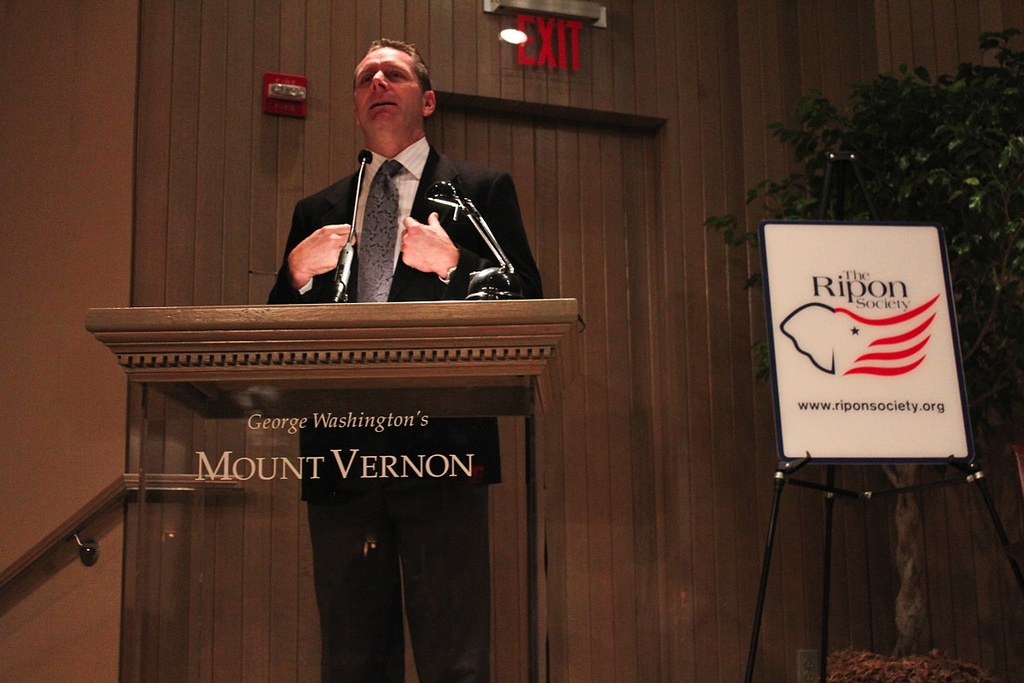In Speech to Hill Aides, Steve Largent Discusses Lessons from the NFL and How Life on the Gridiron Prepared Him for a Life in Politics
WASHINGTON, D.C. – “Win without hating the other side.”
That’s some of the advice former Congressman and Hall of Fame wide receiver Steve Largent shared with a group of senior congressional aides at a recent legislative symposium hosted by The Ripon Society at Mount Vernon.
In his remarks, Largent — who now serves as President and CEO of CTIA-The Wireless Association — discussed not only how life in the NFL helped prepare him for a life in the political arena, but how the lessons he learned on the gridiron can be applied to public service and the challenges facing congressional staff members – and their bosses – today.
“Let me start with an old coach’s admonition,” Largent stated. “It goes, ‘Discipline is doing what you don’t want to do, when you don’t want to do it.’ Winning an election, winning an amendment, getting a bill signed into law — that’s the fun stuff right? It’s like catching passes or scoring touchdowns. If you ask someone if they want to do that, they say, ‘Sure, I’ll sign up for that anytime.’ But none of that stuff can happen without a lot of inglorious, hard, sometimes unappealing work. Most people won’t see it, and it’s not always fun. But it matters — it really matters. It’s what makes the difference between winning or losing.
“Whether you’re an athlete lifting weights, running stadium steps in the summer heat, or forgoing a dessert you might like to eat. Whether you’re a member of Congress or a staff member answering mail, returning calls, or tending to an absolutely overflowing inbox — as I know you often do. It’s the hard work when you think no one is looking, and often when you think there are more fun ways to spend your time. It’s that work that pays off at crunch time. If you want to meet your goals in sports or in politics, you’ve got to put in the work.”
Largent made his remarks at The Ripon Society’s 2012 Legislative and Communications Directors Symposium on Leadership at Mount Vernon,which was held at the home of our Nation’s first President on Friday, February 10th. A group of nearly 200 senior policy and communications aides attended the day-long event, which also featured presentations by Virginia Governor Bob McDonnell, National Journal correspondent Major Garrett, and top members of the House Republican Leadership staff, among other political and legislative leaders.
In his remarks, the former Oklahoma Representative also touched on the partisan rancor in Congress and the need to not only establish friendships with those across the aisle, but to “win without hating” those across the political divide.

“The folks on the other side are your opponents, not your enemies,” Largent told the assembled Hill aides. “Sometimes this is really, really hard to remember. I know that. I can assure you that it certainly wasn’t easy to remember that when I was playing for the Seahawks and we had the Raiders in our division. Those guys were nasty and easy to dislike. But even in great hard-fought rivalries, it was important to remember — most of the time anyway — that the guys across the line were just like me, playing hard and trying to win. That’s true here, too, except that no one in Congress has ever tried to poke me in the eyes on the bottom of a pile after a tackle as they did in Oakland.
“I know that the people who are attracted to politics are a passionate bunch — and that’s a good thing, because passion can take you far. But unbridled, it can also lead you astray. It can lead you places that later you wish you hadn’t gone. The other team might be wrong some of the time — maybe even all of the time. But I found that it really helped to get to know them. I can’t emphasize that enough — to get to know them. I made and have kept some great across-the-aisle friendships — not relationships, but friendships. That is much harder to do if you let the differences of opinion become personal. So don’t. Win without hate. And I would just underscore that — WIN WITHOUT HATING THE OTHER SIDE.”
In response to a question from a member of the audience at the conclusion of his remarks, Largent also discussed a much-reported-on episode that occurred during his service in Congress in the late 1990s when – in a meeting of the House Republican Conference in Room HC-5 of the Capitol — he stood up to the House Republican Leadership over a vote that went against his principles and what he was elected to do.
“We waited until every single member of the House of Representatives who was a Republican got to the room,” Largent said, in describing the scene. “When you get that many members into HC-5 — we had 220, 225, 230, or 240 members, it was crowded and it was hot and a lot of us had been there a long time. Newt got up in front of all of us and started railing away about how some of us thought we were smarter than everyone else and we gotta stick together and move legislation and all that kind of stuff. He said, ‘I just want to challenge the 11 of you that voted against this rule to come and tell this conference why you voted against this rule.’ I knew that I was the one he was thinking about. So I went right up to the front and was the first one to the microphone.
“I described to him a situation I had had in 1982. 1982 was the first strike that the NFL had during my playing years. During the lockout, I said, ‘I don’t feel it’s right for me to strike.’ I signed a contract with the Seattle Seahawks to play for x number of years and x number of dollars — and not a lot of dollars either by the way. My first three years in the NFL, I made $28,000, $35,000 and $42,000. But I signed a contract that said I would play, and ‘82 was one of the years that I signed to play. I said, ‘I don’t feel like because you’ve got a union that I can break my word to the Seahawks. So I can’t strike.’ I literally was called on the carpet by a guy who was employed by the union and was a former player. He came to that meeting, and he was standing up front just like I’m doing right now, and he said, ‘Largent, we have ways to deal with you, and we’ll take care of you later.’ It was not a veiled threat. They had some big people who could do bodily harm to me.
“So I recounted that story and told the Speaker, ‘Mr. Speaker, in all honesty, I’ve been in smaller rooms with bigger people than are in the room right now, and have been threatened with physical harm. So I would tell you, Mr. Speaker, that I came here with a commitment to the people who elected me to vote for legislation that puts the government on a downward path of spending, and not an upward path. So I can’t help you on this vote.’ Then several other guys after me spoke, and it really kind of changed the spirit of the room. People understood why I was doing what I was doing. But it was a tension-filled time, to say the least.”
The Ripon Society is a public policy organization that was founded in 1962 and takes its name from the town where the Republican Party was born in 1854 – Ripon, Wisconsin. One of the main goals of The Ripon Society is to promote the ideas and principles that have made America great and contributed to the GOP’s success. These ideas include keeping our nation secure, keeping taxes low and having a federal government that is smaller, smarter and more accountable to the people.




